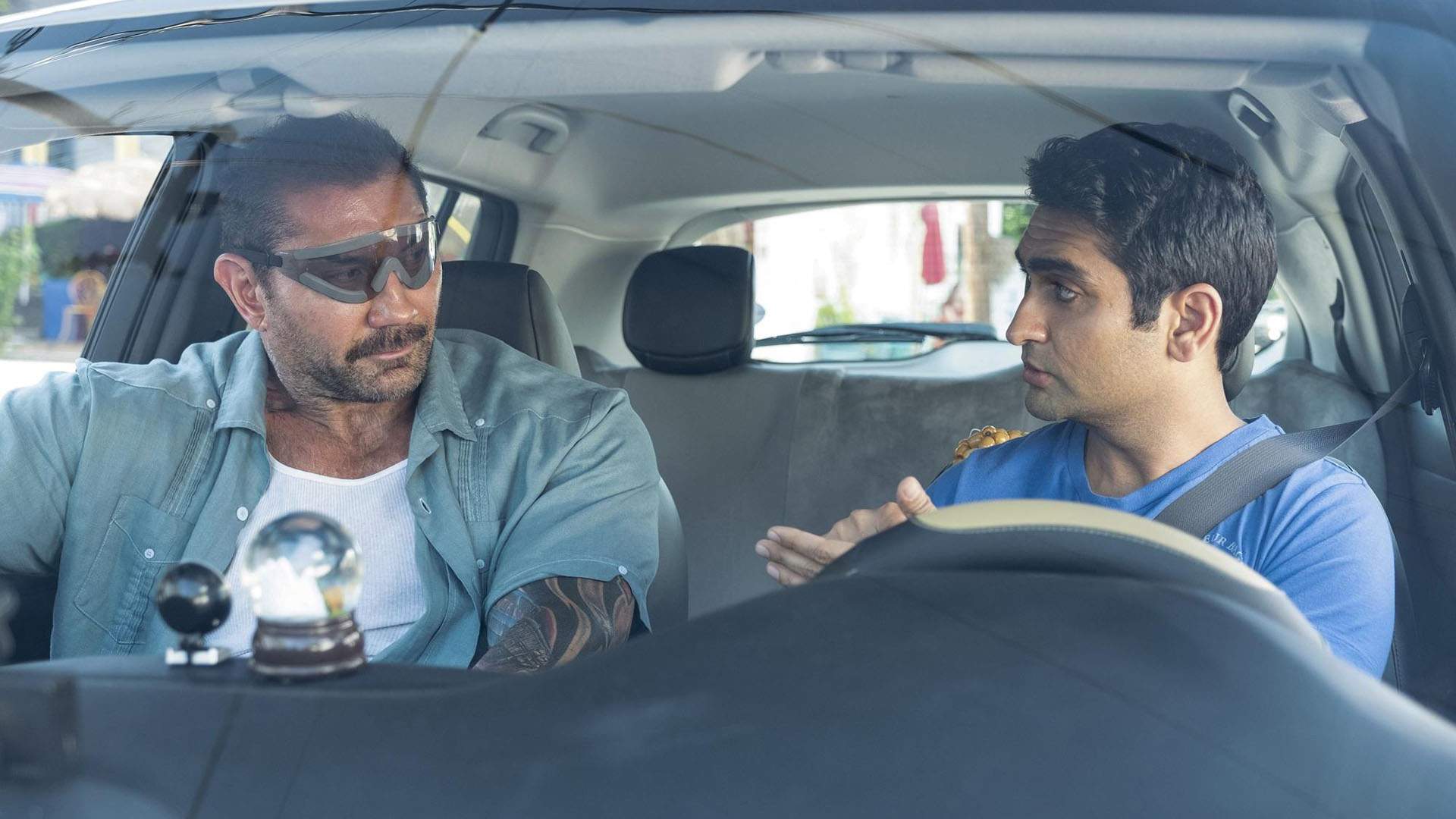Stuber
The odd-couple paring of Kumail Nanjiani and Dave Bautista can't save this pedestrian action-comedy.
Overview
In Stuber, Uber driver Stu (Kumail Nanjiani) is obsessed with his all-important rating. He's hardly living the dream — selling sporting goods by day and ferrying around fellow Los Angelenos in your spare time is no one's fantasy — but if his score drops below four, he'll lose his side hustle. Here's hoping that the folks telling his tale don't share the same fixation with numbers, or a similar need to meet a certain ranking. As much as this tired ride of a movie can't stop mentioning stars (in conversation, on Stu's license plate, in his pleas to his customers and in the feedback he pores over after each trip), it doesn't earn many itself.
Even worse — the few flesh-and-blood stars that Stuber does have, it thoroughly wastes. There's obvious odd-couple appeal in teaming up Nanjiani with Dave Bautista, especially with the former in awkward nice-guy mode and the latter playing it gruff and gritty. And yet, even when they're leaning into their clear-cut character traits to an exaggerated extreme, the duo remain on autopilot. If director Michael Dowse (Goon) merely asked his actors to channel their respective vibes in The Big Sick and Guardians of the Galaxy, just in a less-convincing manner, that's what he's received. Unsurprisingly, pairing a watered-down version of Nanjiani and Bautista's best-known roles with a grating attempt to revive 80s and 90s action-comedies proves as pedestrian as it sounds.
Bautista's determined detective Vic hops into Stu's Uber on an already-eventful day. Hours after undergoing laser eye surgery, the hardened cop receives a tip about the elusive drug dealer (Iko Uwais) who killed his partner (Karen Gillan) six months earlier. Vic can't see, let alone drive, which is where Stu comes in. Vic also hasn't used a ride-sharing app before, so as he tracks his lead from a warehouse to a male strip club, and then zigzags from an animal hospital to his daughter's (Natalie Morales) art show, he keeps the protesting Stu behind the wheel. Every time that the reluctant sidekick tries to flee, with his best friend and secret crush (Betty Gilpin) continually calling in a drunk and vulnerable state, Vic plays his trump card: the threat of giving Stu a bad rating.
Although it might initially appear otherwise, this isn't a comic reimagining of Michael Mann's Collateral, swapping a hitman and a cabbie for a police officer and an Uber driver. And, while the scenario is rife with potential commentary about the plague of insecurity that has become normalised in today's gig economy, screenwriter Tripper Clancy doesn't take that path either. The fact that an ordinary guy is basically held hostage not just by a gun-toting symbol of law and order, but by the need to retain a near-exploitative second job that relies heavily upon keeping privileged customers happy, should serve up a potent, insightful and searing statement about modern-day life. But in Stuber, it's just an excuse for an onslaught of outdated Lethal Weapon and Rush Hour-style antics, plenty of routine violence, and an escalating body count.
To be fair, Dowse and Clancy don't just play up the buddy-cop angle, although Bautista always seems seconds away from declaring that he's too old for this shit. Taking the clown car approach — aka trying to stuff in as many possible sources of humour as it can, even if they don't fit — Stuber also attempts to wring laughs out of physical comedy, and find affectionate chuckles in Stu and Vic's mismatched interpretations of masculinity. Alas, watching someone stumble around with a visual impairment, even a temporary one, isn't funny. Nor is seeing paper-thin archetypes realise that being a man requires the right balance of sensitivity and courage, particularly when the supposedly heartwarming situation is completely one-note. That the movie's best joke stems from a throwaway line about plural nouns, and its second best from calling Vic "Douche Lundgren", says a lot.
Add Dowse's visuals to Stuber's pile of misguided choices, with the film careening and chaotic in both its look and feel. The only time that it boasts any real spark is when the under-utilised Uwais (The Raid) unleashes his martial arts skills. That said, the picture's dull, commercial-style appearance does underscore its blatant core as a virtual Uber ad. Showing just how outlandishly messy a drive with the ride-sharing service could be isn't likely to entice new car-owners or customers, but that's not the point. Instead, Stuber mentions the company's name more times than a jingle, explains how it operates and even references its other various services. It's product placement packaged as a movie, and only the first part of that equation — the wrong part — works.





